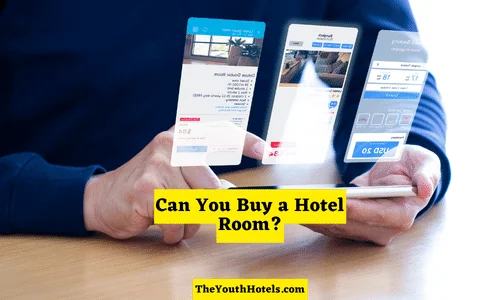Can You Buy a Hotel Room?

In the world of real estate, owning a hotel room might seem like an unusual concept. Traditionally, hotels have been owned by large hospitality companies or individual investors who purchase entire properties.
However, with the rise of innovative investment models and online platforms, the possibility of buying a hotel room as an individual investor has become a reality.
In this article, we will explore the feasibility of buying a hotel room, the various methods available, and the factors to consider before making such a purchase.
Navigate Where You Want:
- Can You Buy a Hotel Room?
- Can You Buy a Hotel Room Permanently?
- Understanding The Concept of Hotel Ownership
- Traditional Ways of Acquiring Hotel Rooms
- Direct Purchase:
- Auctions:
- The Emergence of Online Platforms
- Benefits and Considerations of Buying Hotel Rooms
- Potential returns:
- Diversification:
- Risks and challenges:
- Factors to Consider Before Making a Purchase
- Location and market demand:
- Hotel brand and reputation:
- Financial viability:
- Legal Aspects and Contracts
- Alternative Options for Investment
- Conclusion
- FAQs: People Also Asked
Can You Buy a Hotel Room?
Absolutely, you can buy a hotel room without any problem. Many hotels offer the option to purchase a room either as an individual or as part of a real estate investment opportunity.
Buying a hotel room involves purchasing a unit within a hotel property, giving you ownership of that specific room.
You may have the right to use it for personal stays or rent it out for income. Details and terms vary, so research and consult professionals before purchasing.
Can You Buy a Hotel Room Permanently?
Yes, you can buy a hotel room permanently. Some hotels offer the opportunity to purchase a room as a permanent investment.
By buying a hotel room, you become the permanent owner of that specific room.
This ownership may come with certain benefits, such as the ability to use the room for personal stays or rent it out to guests for income.
However, it’s important to note that the specific terms and conditions may vary depending on the hotel and location, so it’s advisable to research and consult with professionals before making a permanent purchase.
Understanding The Concept of Hotel Ownership
When we think about owning a hotel room, it’s essential to differentiate between owning the physical space and owning the operational aspects of the hotel.
Buying a hotel room typically means purchasing a unit within a hotel property, entitling the owner to certain benefits and potential returns.
However, it’s crucial to remember that the overall management and operation of the hotel are handled by the hotel management company or the property owner.
Traditional Ways of Acquiring Hotel Rooms
Direct Purchase:
One of the traditional methods of acquiring a hotel room is through direct purchase.
This involves approaching the hotel management or the property developer directly and negotiating the purchase of a specific room or suite within the hotel.
This method requires substantial capital investment but provides the advantage of ownership and potential long-term returns.
Auctions:
Another way to acquire a hotel room is through auctions. Occasionally, hotel rooms are put up for auction, allowing interested buyers to bid on them.
This method can be an exciting opportunity for investors looking to acquire a hotel room at a potentially lower price.
However, it’s essential to research the auction process and understand any associated risks before participating.
The Emergence of Online Platforms
In recent years, online platforms have disrupted the traditional methods of hotel room acquisition. These platforms allow individuals to invest in fractional ownership or shares of hotel rooms.
Instead of purchasing an entire room, investors can buy a fraction of a room, often through real estate investment platforms.
This model opens up hotel ownership to a wider range of investors, reducing the barrier to entry.
Benefits and Considerations of Buying Hotel Rooms
Potential returns:
Buying a hotel room can provide investors with a steady stream of income through rental returns.
Additionally, if the hotel performs well, there is potential for capital appreciation, allowing investors to profit from the increased value of their room.
Diversification:
Hotel room ownership can offer diversification within an investment portfolio.
It provides exposure to the hospitality sector, which has its own market dynamics and can behave differently compared to other real estate assets.
Risks and challenges:
Like any investment, buying a hotel room comes with risks.
Fluctuations in the tourism industry, economic downturns, and changes in travel trends can impact the performance of the hotel and the investor’s returns.
It’s crucial to assess the risks and be prepared for potential challenges.
Factors to Consider Before Making a Purchase
Location and market demand:
The location of the hotel and the demand for accommodations in that area are critical factors to consider.
Investing in a hotel room in a popular tourist destination or a thriving business hub can increase the likelihood of consistent occupancy and higher rental rates.
Hotel brand and reputation:
The reputation and brand recognition of the hotel can influence its performance and appeal to potential guests.
Investing in a hotel with a well-established brand can assure quality and attract a broader customer base.
Financial viability:
Conducting a thorough financial analysis is essential before buying a hotel room. Consider factors such as the projected rental income, operating expenses, management fees, and any potential additional costs associated with the investment.
Legal Aspects and Contracts
Buying a hotel room involves legal agreements and contracts. It’s important to review all the documents carefully, including the terms and conditions of the purchase, rental agreements, and any potential restrictions or limitations imposed by the hotel management or property owner.
Alternative Options for Investment
Apart from buying a hotel room, investors interested in the hospitality sector can explore alternative options such as investing in real estate investment trusts (REITs) that specialize in hotels or considering timeshare ownership.
These options offer different levels of involvement and potential returns, so it’s crucial to evaluate them based on individual preferences and investment goals.
Conclusion
While it may seem unconventional, buying a hotel room has become a viable investment option for individual investors.
The rise of online platforms and innovative investment models has opened up opportunities for broader participation in the hospitality sector.
However, it’s important to carefully consider the location, market demand, financial viability, and legal aspects before making a purchase.
Investing in a hotel room can provide potential returns, diversification, and the chance to be part of the dynamic world of hospitality.
FAQs: People Also Asked
Yes, depending on the availability and investment opportunities, you can purchase multiple hotel rooms.
Risks include fluctuations in the tourism industry, economic downturns, and changes in travel trends, which can impact the hotel’s performance and investor returns.
Hotel rooms are typically managed by hotel management companies or the property owner, who handles the operational aspects, maintenance, and guest services.
Depending on the terms of the purchase agreement and the hotel’s policies, you may have the option to use the hotel room for personal stays, subject to availability.
Hotel rooms are generally considered illiquid investments since they may not be easily sold or converted into cash compared to more liquid assets like stocks or bonds.
Also Read:





